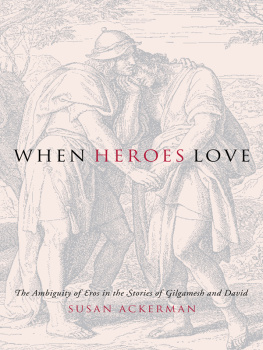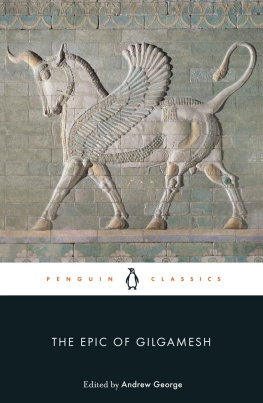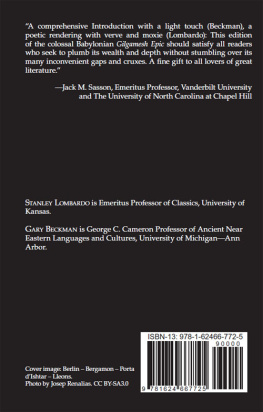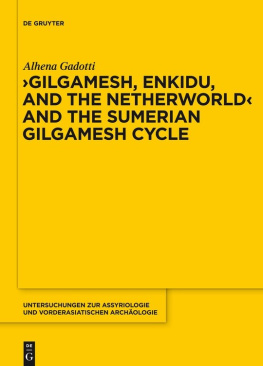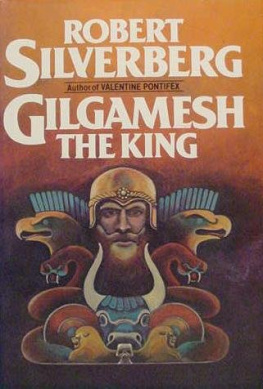When Heroes Love

GENDER, THEORY, AND RELIGION

Columbia University Press
Publishers Since 1893
New York, Chichester, West Sussex
cup.columbia.edu
Copyright 2005 Columbia University Press
All rights reserved
E-ISBN 978-0-231-50725-7
Library of Congress Cataloging-in-Publication Data
Ackerman, Susan.
When heroes love : the ambiguity of eros in the stories of Gilgamesh and David / Susan Ackerman.
p. cm.(Gender, theory, and religion)
Includes bibliographical references and index.
ISBN 0-231-13260-3 (cloth : alk. paper)
1. Gilgamesh. 2. David, King of Israel. 3. Homosexuality in literature. 4. Homosexuality in the Bible. 5. Jonathan (Biblical character). 6. Bible. O.T. SamuelCriticism, interpretation, etc. I. Title. II. Series.
PJ3771.G6A25 2005
809.93353dc22
2004065670
A Columbia University Press E-book.
CUP would be pleased to hear about your reading experience with this e-book at .
For Richard
in celebration of the twenty-eight years of our friendship
Contents


| AB | Anchor Bible |
| AbB | F. R. Kraus, ed., Altbabylonische Briefe in Umschrift und bersetzung |
| ABD | David Noel Freedman, ed., Anchor Bible Dictionary |
| AHw | Wolfram von Soden, Akkadisches Handwrterbuch 13 |
| ANET | James B. Pritchard, ed., Ancient Near Eastern Texts Relating to the Old Testament, 3d ed. with supplement |
| AOAT | Alter Orient und Altes Testament |
| BA | Biblical Archaeologist |
| BARev | Biblical Archaeology Review |
| BASOR | Bulletin of the American Schools of Oriental Research |
| BCE | Before the Common (or Christian) Era |
| BDB | Francis Brown, S. R. Driver, and Charles A. Briggs, A Hebrew and English Lexicon of the Old Testament |
| Bib | Biblica |
| BO | Bibliotheca orientalis |
| CAD | Ignace J. Gelb, et al., eds., The Assyrian Dictionary of the Oriental Institute of the University of Chicago |
| CAT | Manfried Dietrich, Oswald Loretz, and Joaqun Sanmartn, The Cuneiform Alphabetic Texts from Ugarit, Ras Ibn Hani and Other Places |
| CBQ | Catholic Biblical Quarterly |
| CE | Common (or Christian) Era |
| CML | Classical and Modern Literature |
| HR | History of Religions |
| HSM | Harvard Semitic Monographs |
| HSS | Harvard Semitic Studies |
| HTR | Harvard Theological Review |
| IDBS | Keith Crim, ed., Interpreters Dictionary of the Bible, Supplementary Volume |
| IEJ | Israel Exploration Journal |
| Int | Interpretation |
| JAAR | Journal of the American Academy of Religion |
| JANESCU | Journal of the Ancient Near Eastern Society of Columbia University |
| JAOS | Journal of the American Oriental Society |
| JBL | Journal of Biblical Literature |
| JCS | Journal of Cuneiform Studies |
| JNES | Journal of Near Eastern Studies |
| JSOT | Journal for the Study of the Old Testament |
| JSOTSup | Journal for the Study of the Old Testament Supplement Series |
| JSSR | Journal for the Scientific Study of Religion |
| LSJ | Henry George Liddell and Robert Scott, A Greek-English Lexicon, revised and augmented by Henry Stuart Jones |
| LXX | Septuagint |
| NEA | Near Eastern Archaeology |
| NEB | New English Bible |
| NJPS | Bible, New Jewish Publication Society Version |
| NRSV | Bible, New Revised Standard Version |
| OLP | Orientalia lovaniensia periodica |
| OTL | Old Testament Library |
| RA | Revue dassyriologie et darchologie orientale |
| REB | Revised English Bible |
| RSV | Bible, Revised Standard Version |
| SBLDS | Society of Biblical Literature Dissertation Series |
| SBLWAW | Society of Biblical Literature Writings from the Ancient World |
| SJOT | Scandinavian Journal of the Old Testament |
| TDOT | G. Johannes Botterweck and Helmer Ringgren, eds., Theological Dictionary of the Old Testament |
| TLB | Franz M. Th. de Liagre Bhl, ed., Tabulae Cuneiformes a de Liagre Bhl collectae, Leidae Conservatae |
| UF | Ugarit-Forschungen |
| VT | Vetus Testamentum |
| ZA | Zeitschrift fr Assyriologie |
| ZAW | Zeitschrift fr die alttestamentliche Wissenschaft |
At least a thousand years separate the stories of the ancient Mesopotamian King Gilgamesh and the ancient Israelite King David, or at least a thousand years separate the earliest forms of the stories of Gilgamesh and David that have come down to us. At least a thousand miles, moreover, separate Gilgameshs ancient city-state fiefdom of Uruk and Davids ancient capital city of Jerusalem, or at least a thousand miles separated these two cities for any traveler in antiquity, who could hardly journey as the crow flies, across the Arabian desert, but instead had to follow the more roundabout route that tracked the waterways of the Orontes and Euphrates Rivers. Everything we know about the historical Gilgamesh in addition suggests that Gilgamesh was of Sumerian stock and not of the Semitic ethnos of which David was a part.
Nevertheless, scholars have frequently been drawn to compare these two great kings tales, It is also the case that, despite the distances that separated them, the peoples of ancient Mesopotamia and the peoples of ancient Israel were closely associated with one another during the period in which the Mesopotamian Epic of Gilgamesh and the biblical story of David came into their final forms; indeed, the ancient Mesopotamian empires of Assyria and Babylonia conquered and established themselves as overlords of the ancient Israelite Northern and Southern Kingdoms (Israel and Judah) in the eighth through the sixth centuries BCE. Furthermore, whatever we might claim regarding the historical Gilgameshs Sumerian origins, the ancient Mesopotamian poem that recounts his tale is a Semitic composition, the creation of the Akkadian people who supplanted the Sumerians of southern Mesopotamia in the late third and early second millennia BCE.
Kings Gilgamesh and David are also both celebrated in their stories as particularly valiant warriors, in fact, as warriors whose heroic abilities are really larger than life. Gilgamesh is lauded in his Epic as the greatest among kings, whose bravery and might surpass any others;
Next page
